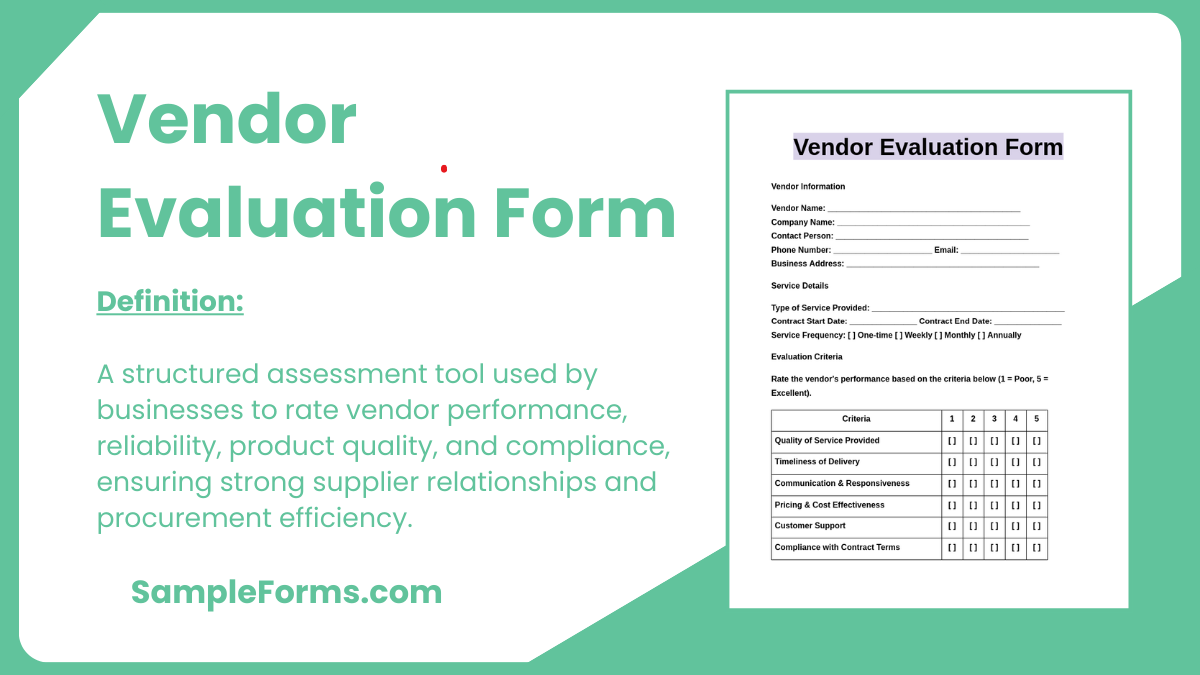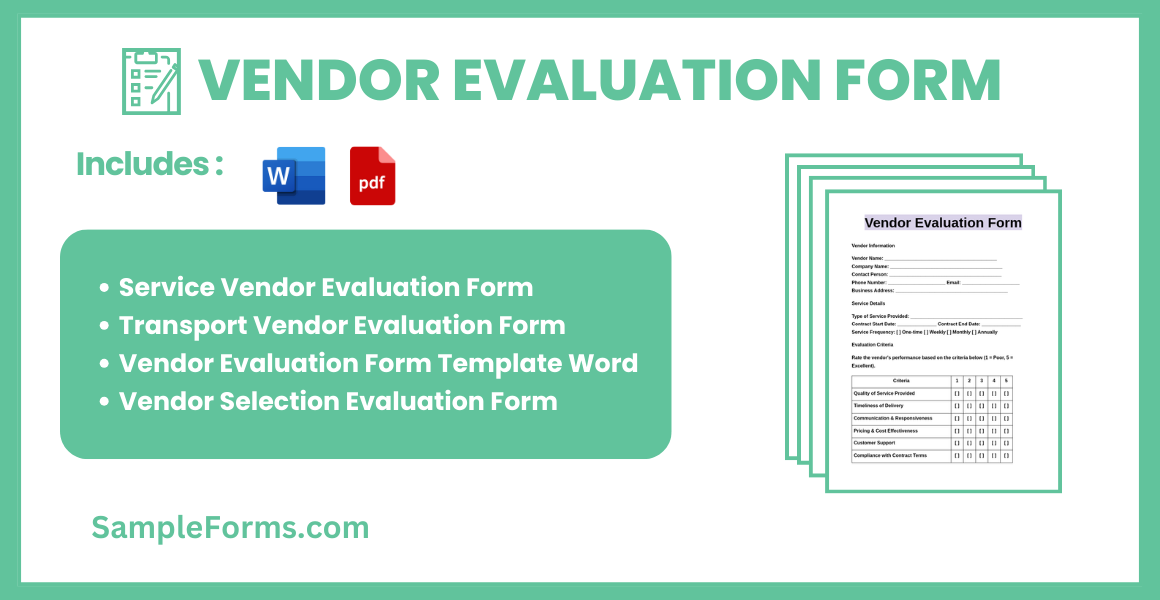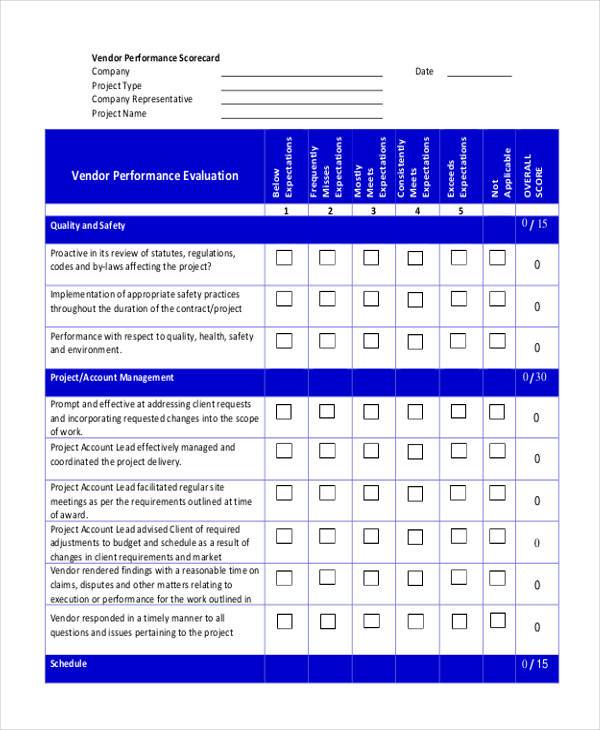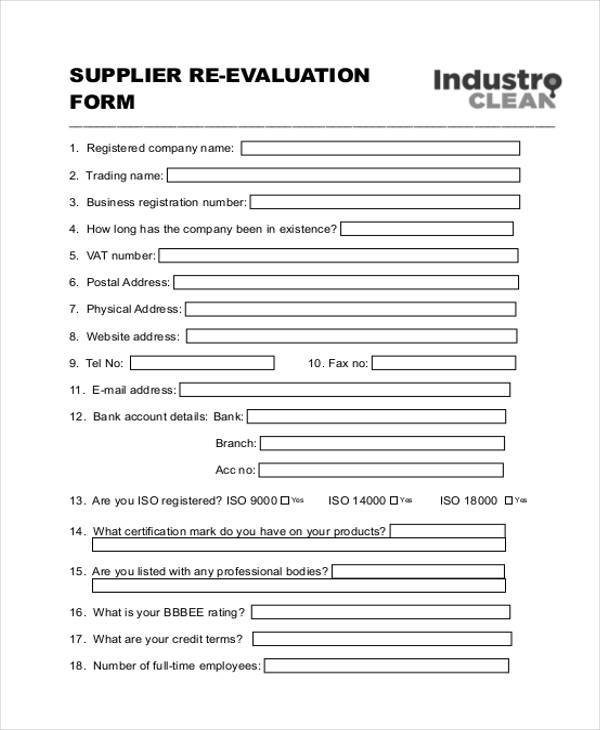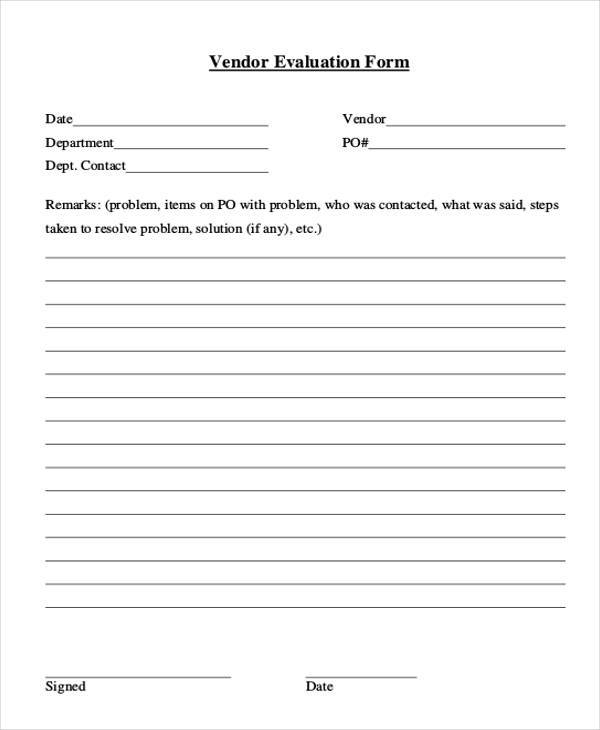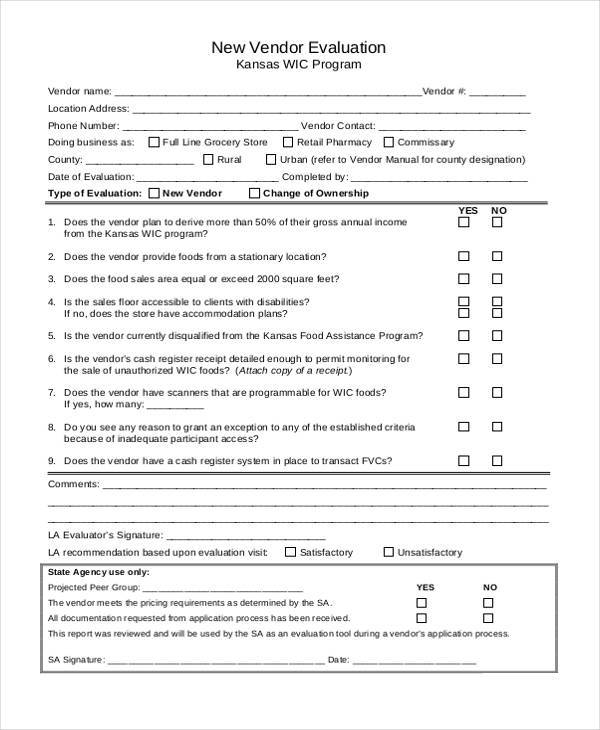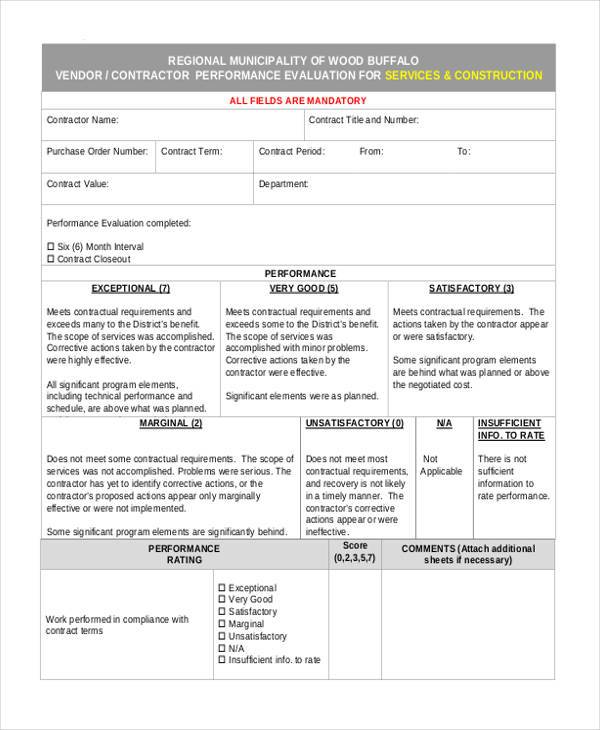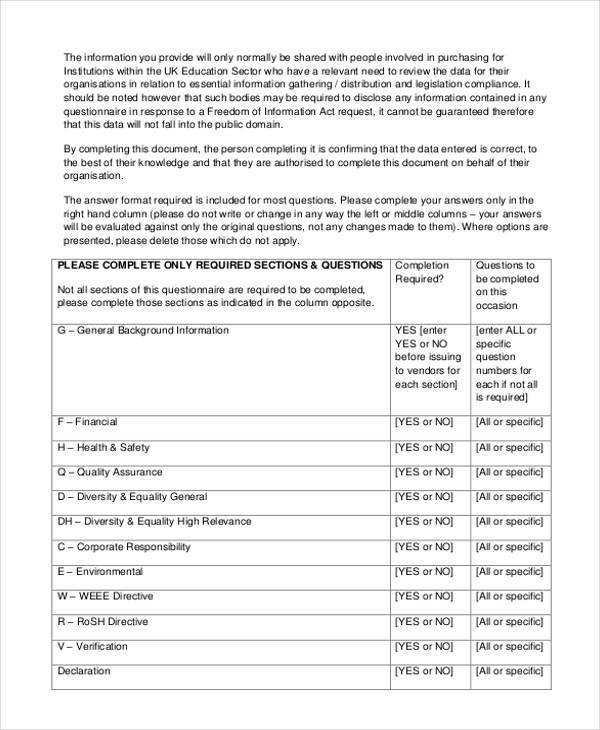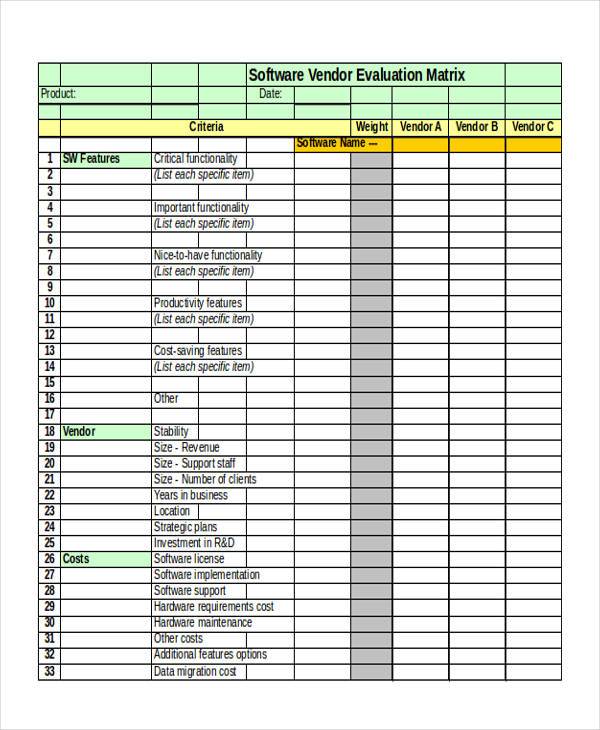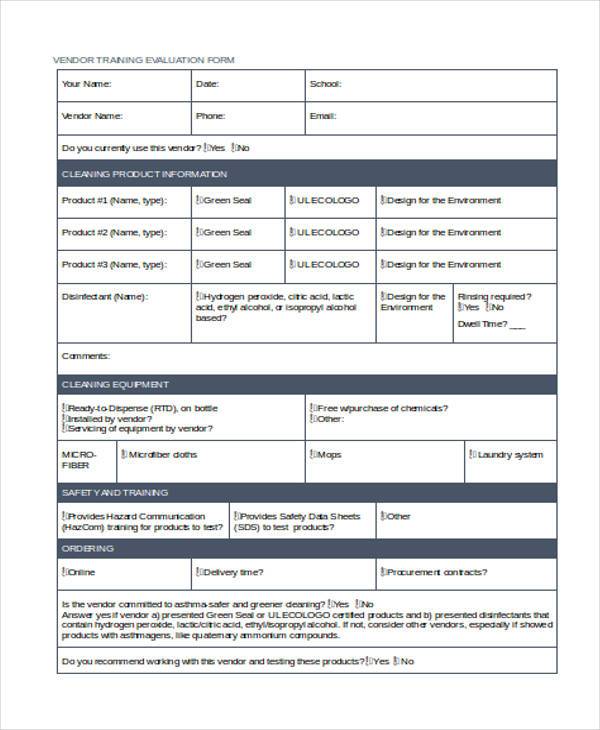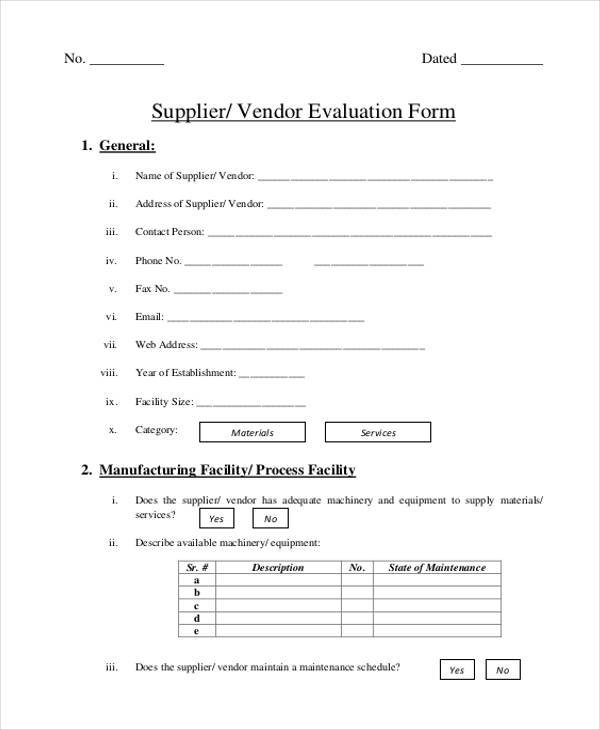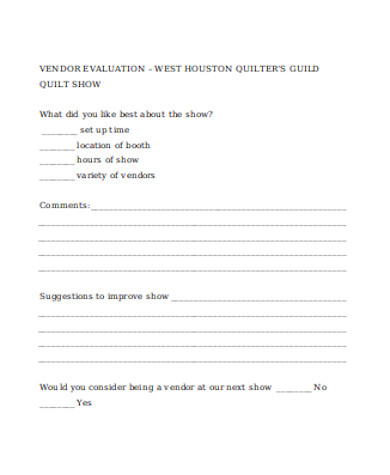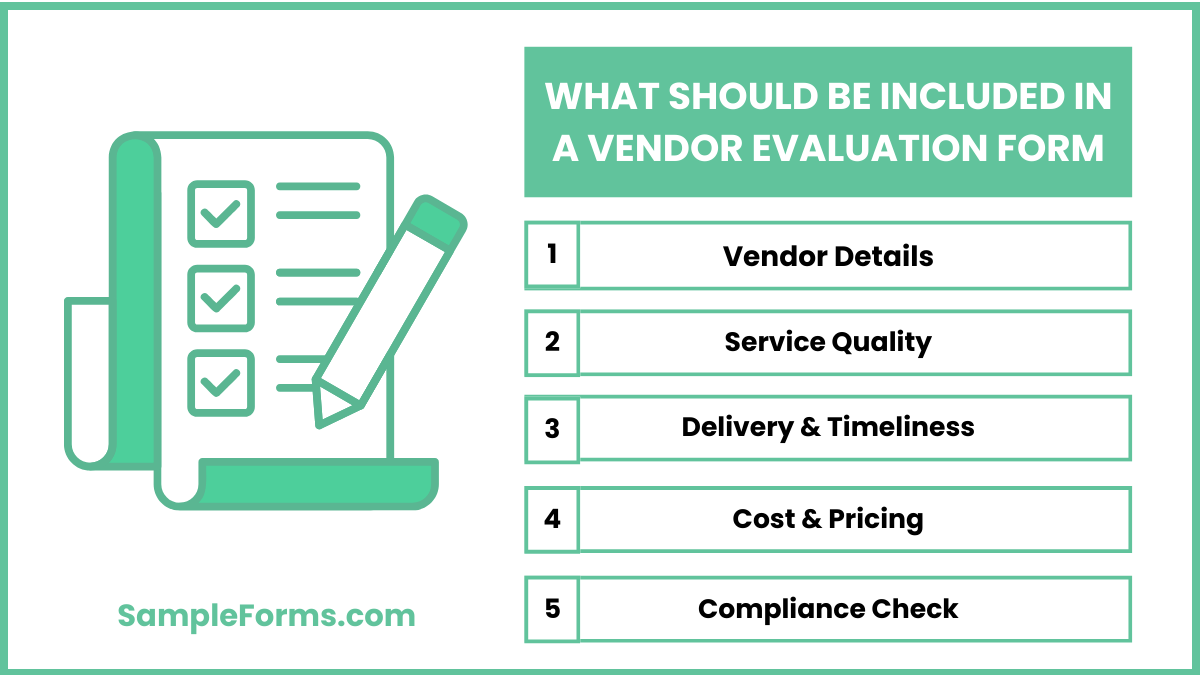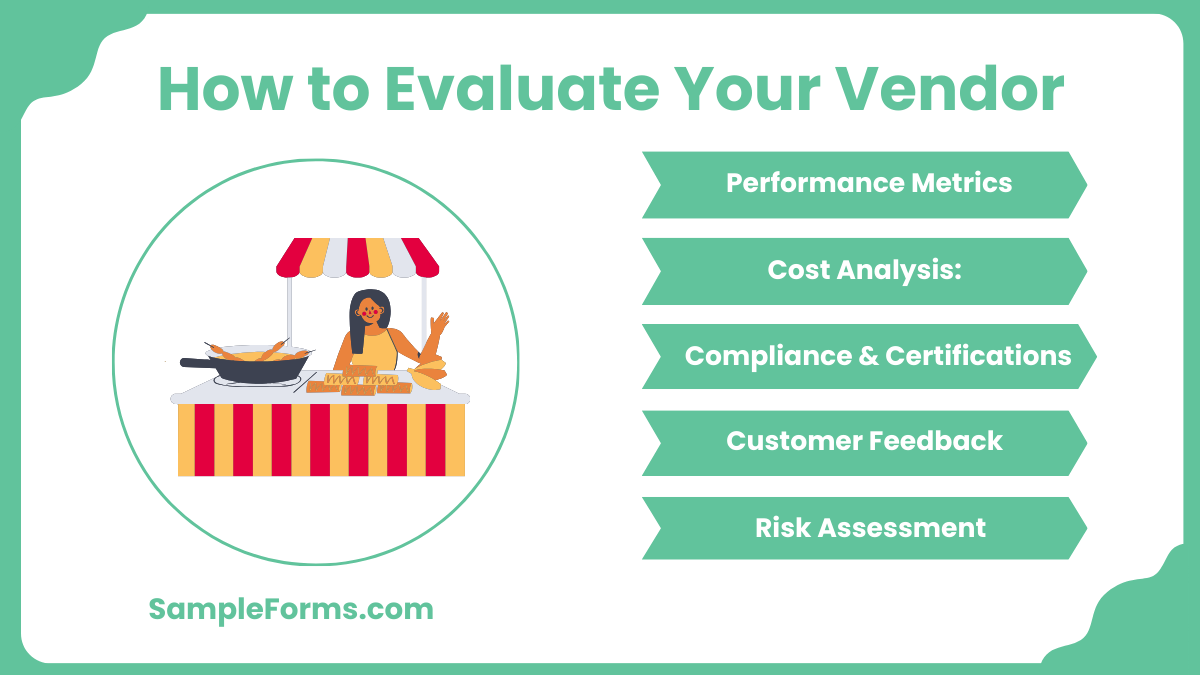A Vendor Form is essential for businesses to assess supplier performance, reliability, and quality. A well-structured Evaluation Form ensures companies work with trusted vendors who meet industry standards. The form typically includes sections to rate vendors on pricing, product quality, delivery timelines, compliance, and customer service. Businesses use it to monitor supplier relationships, ensure accountability, and improve procurement efficiency. This guide covers the key components, best practices, and examples of an effective Vendor Evaluation Form, helping organizations streamline supplier selection and enhance business operations.
Download Vendor Evaluation Form Bundle
What is Vendor Evaluation Form?
A Vendor Evaluation Form is a structured document used by organizations to assess supplier performance based on key factors like quality, cost, and service. It helps businesses measure vendor efficiency and reliability, ensuring long-term partnerships. This form includes detailed scoring criteria, such as on-time delivery, contract compliance, customer support, and product standards. Companies use this evaluation to decide whether to continue, renegotiate, or terminate vendor contracts. It plays a crucial role in improving procurement strategies and ensuring optimal supplier relationships.
Vendor Evaluation Format
Vendor Details
Company Name: [Insert Name]
Vendor ID (If Applicable): [XXXXXXXX]
Contact Person: [Insert Name]
Product/Service Details
Products/Services Provided: [List Offerings]
Order Frequency: [One-Time/Regular]
Performance Assessment
Delivery Timeliness: [Excellent/Good/Poor]
Product Quality: [Excellent/Good/Poor]
Customer Support: [Excellent/Good/Poor]
Recommendation & Remarks
Further Engagement: [Yes/No]
Improvement Areas: [Specify]
Approval
Evaluator Signature: [Signature]
Date: [MM/DD/YYYY]
Service Vendor Evaluation Form
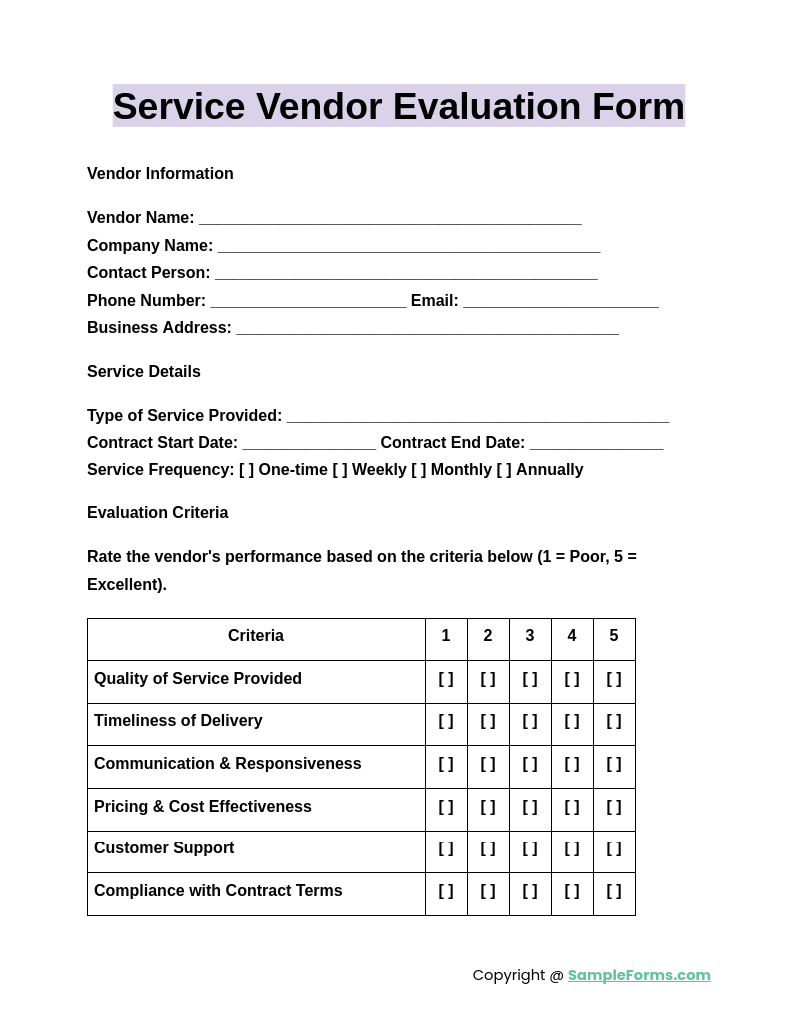
A Service Vendor Evaluation Form assesses vendor performance based on service quality, reliability, and compliance. Similar to an Employee Self Evaluation Form, it helps businesses measure vendor efficiency to ensure service excellence and long-term collaboration.
Transport Vendor Evaluation Form
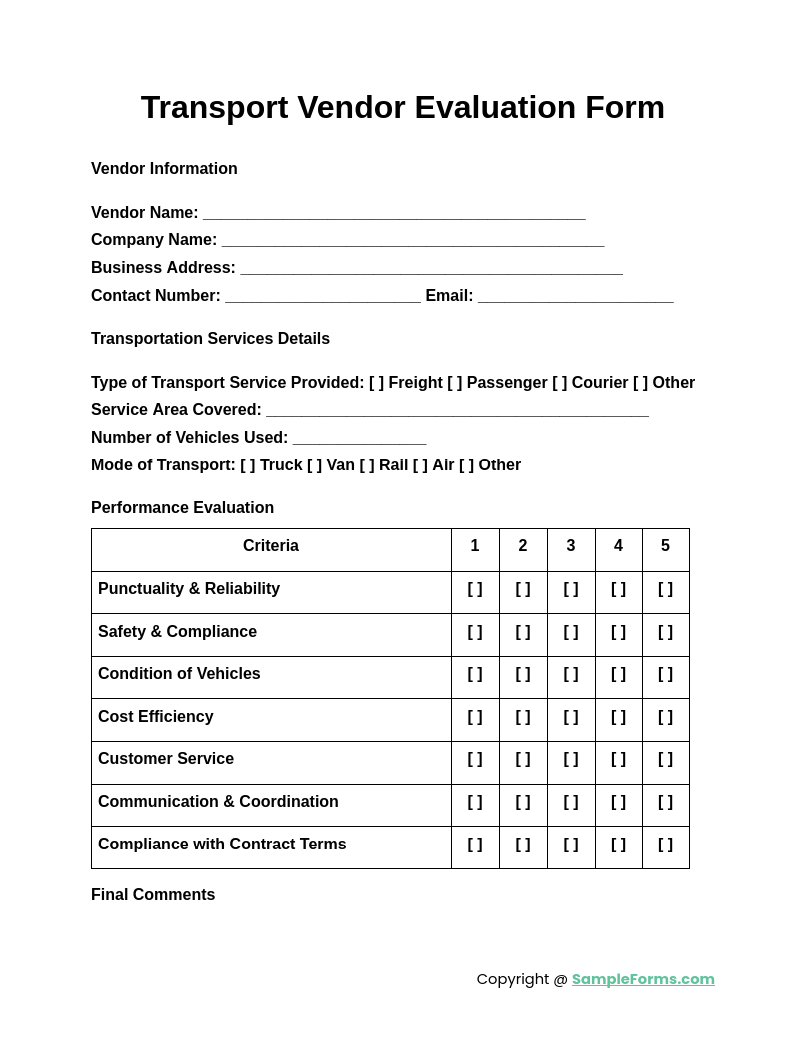
A Transport Vendor Evaluation Form evaluates transportation service providers on punctuality, safety, and cost-effectiveness. Similar to a Peer Evaluation Form, it ensures consistent performance monitoring for selecting reliable transport vendors.
Vendor Evaluation Form Template Word
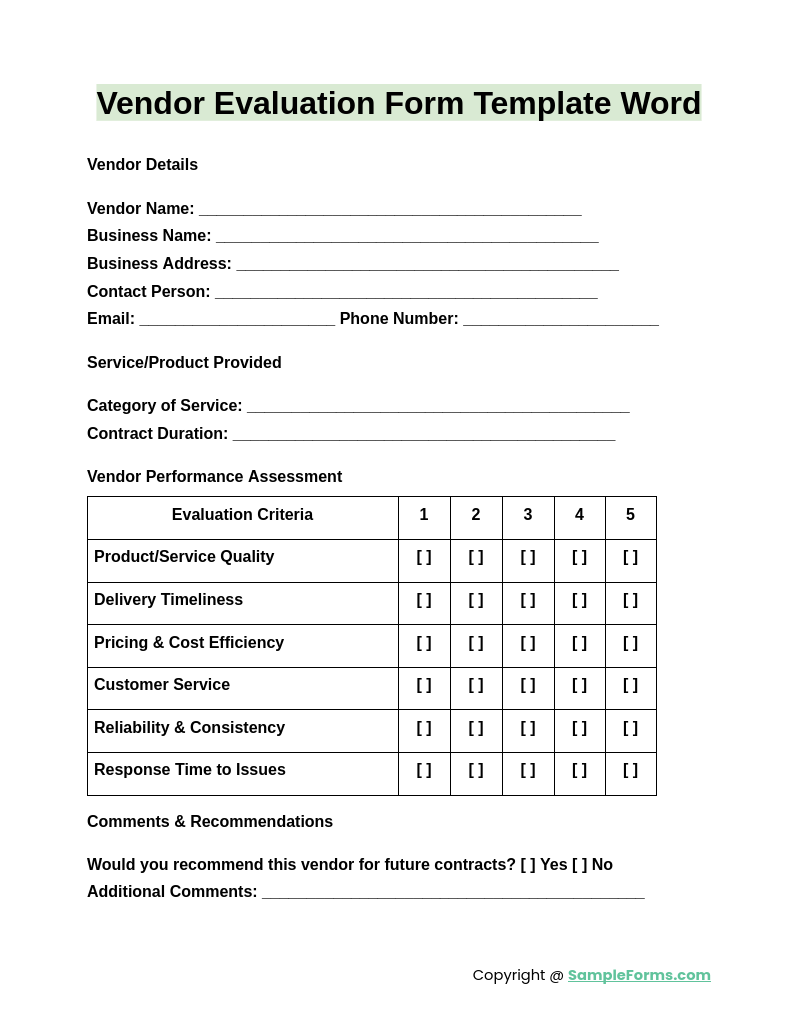
A Vendor Evaluation Form Template Word provides a standardized format for assessing vendor performance. Similar to an Interview Evaluation Form, it helps businesses make informed decisions by structuring rating criteria efficiently.
Vendor Selection Evaluation Form
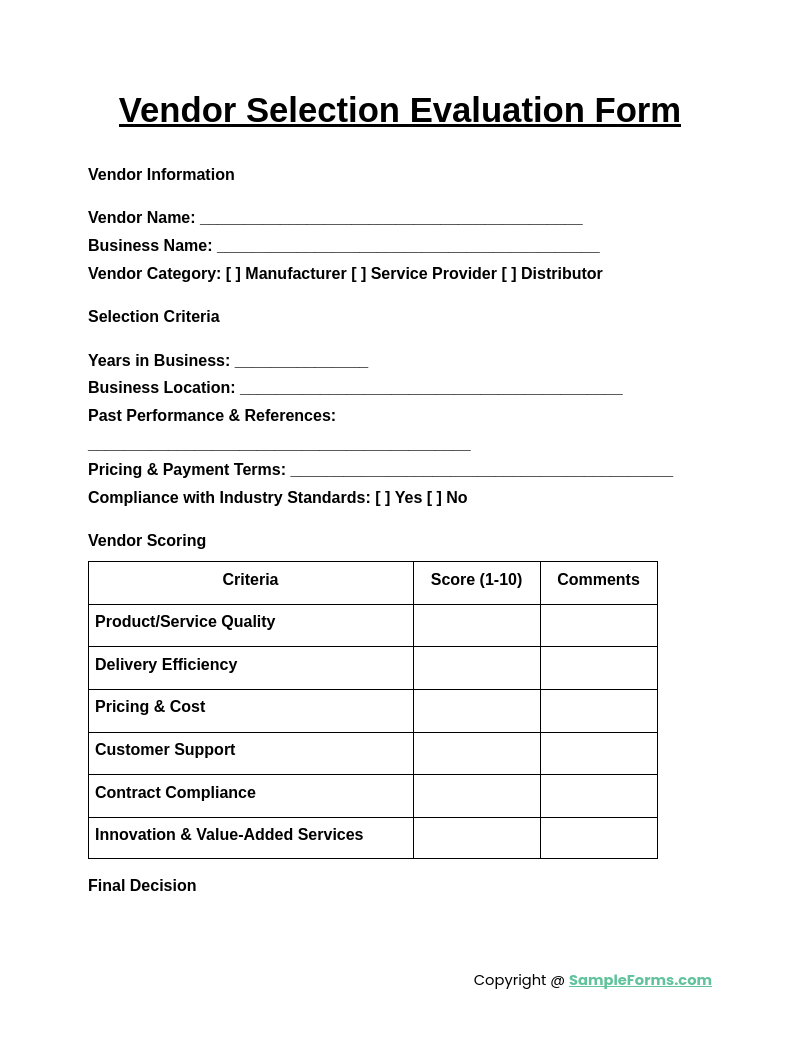
A Vendor Selection Evaluation Form helps businesses choose the right vendor based on pricing, quality, and service. Similar to a Presentation Evaluation Form, it ensures structured assessment for informed supplier selection.
Browse More Vendor Evaluation Forms
Vendor Performance Evaluation Form
Vendor Re-Evaluation Form Sample
Vendor Evaluation Form Sample
New Vendor Evaluation Form
Service Vendor Performance Evaluation Form
Recruitment Vendor Evaluation Form
Software Vendor Evaluation Form
Vendor Training Evaluation Form
Supplier/Vendor Evaluation Form
General Vendor Evaluation Form
What Should Be Included in a Vendor Evaluation Form?
A Vendor Evaluation Form must include key assessment criteria to measure supplier efficiency and reliability for long-term business collaboration.
- Vendor Details: Company name, address, and contact information.
- Service Quality: Ratings based on product or service performance.
- Delivery & Timeliness: Evaluation of order accuracy and promptness.
- Cost & Pricing: Comparison of vendor rates with competitors.
- Compliance Check: Verification of legal and ethical business standards.
How Do You Perform a Vendor Assessment?
A structured vendor assessment ensures business efficiency. A Vendor Assessment Form is crucial for evaluating vendors based on predefined performance indicators.
- Define Criteria: Set performance benchmarks for service, cost, and compliance.
- Collect Vendor Data: Use past transactions and service records for evaluation.
- Analyze Performance: Compare vendor outputs with expected outcomes.
- Score & Rate Vendors: Assign numerical scores to measure vendor efficiency.
- Make Final Decision: Choose vendors that align with business goals.
What Are the Elements of Vendor Evaluation?
Vendor evaluation involves multiple factors that impact business operations. A Vendor Registration Form collects these details for a structured selection process.
- Financial Stability: Assess the vendor’s financial strength to ensure long-term reliability.
- Product/Service Quality: Check standards, certifications, and customer reviews.
- Operational Capacity: Evaluate the vendor’s ability to meet large orders or complex requirements.
- Legal & Compliance: Ensure adherence to industry regulations and policies.
- Post-Sales Support: Assess vendor responsiveness in handling complaints and service issues.
How to Evaluate Your Vendor?
Evaluating a vendor ensures quality, reliability, and efficiency. A Vendor Information Form helps gather essential details for assessment before finalizing business partnerships.
- Performance Metrics: Review delivery timelines, service quality, and adherence to contractual terms.
- Cost Analysis: Compare pricing with market standards to ensure competitive rates.
- Compliance & Certifications: Verify regulatory compliance, licenses, and certifications.
- Customer Feedback: Gather reviews from past clients to measure satisfaction.
- Risk Assessment: Identify financial stability and potential operational risks.
How Do You Evaluate a Vendor in 5 Easy Steps?
Evaluating a vendor efficiently requires a systematic approach. A Vendor Event Form helps track vendor participation and performance in business dealings.
- Define Expectations: Establish clear performance and quality requirements.
- Review Past Transactions: Analyze historical performance and issue resolution.
- Conduct Surveys & Audits: Gather internal and external feedback on vendor reliability.
- Rate Vendor Performance: Use scoring methods for objective decision-making.
- Establish Ongoing Monitoring: Maintain periodic assessments to ensure consistent performance.
How is vendor evaluation being done?
Vendor evaluation assesses supplier quality, cost, and reliability. Similar to a Food Sensory Evaluation Form, it ensures vendors meet business standards through performance tracking and compliance verification.
How do you measure supplier performance?
Supplier performance is measured using delivery time, cost-effectiveness, and quality. Similar to a Speech Evaluation Form, it follows structured scoring criteria for consistency and improvement tracking.
How do I make my own evaluation form?
Create a structured form with key assessment metrics. Similar to a Supplier Evaluation Form, include performance, compliance, and cost analysis sections for effective vendor assessment.
How to conduct a vendor review?
Review vendor performance through audits and feedback. Similar to a Contractor Evaluation Form, ensure compliance, reliability, and service efficiency before contract renewal or termination.
What is a vendor evaluation matrix?
A vendor evaluation matrix compares suppliers based on performance and pricing. Similar to a Nurse Evaluation Form, it scores vendors on key performance indicators for better decision-making.
What are the criteria for vendor evaluation rating?
Criteria include quality, reliability, cost, and compliance. Similar to a Debate Evaluation Form, a structured rating system helps measure vendor effectiveness systematically.
Which factor is important when evaluating a vendor?
Reliability is a key factor. Similar to an Internship Evaluation Form, vendor consistency, service quality, and contract adherence determine business partnership value.
How do you assess vendor performance?
Assess performance using service efficiency, cost-effectiveness, and compliance. Similar to a Food Evaluation Form, structured ratings ensure reliable vendor performance tracking.
What is a vendor QBR?
A Vendor QBR (Quarterly Business Review) evaluates supplier performance. Similar to a Course Evaluation Form, it ensures continuous improvement and alignment with business goals.
What is a vendor performance evaluation?
Vendor performance evaluation tracks efficiency, quality, and compliance. Similar to a Mentor Evaluation Form, it ensures vendors meet business expectations consistently.
A Vendor Evaluation Form is a vital tool for assessing supplier performance and maintaining quality control in procurement. By evaluating vendors based on key metrics, businesses can improve efficiency and minimize risks. Regular vendor assessments ensure high standards, better compliance, and long-term partnerships. Whether used for small businesses or large enterprises, this form helps optimize supplier management. Additionally, integrating a Training Evaluation Form can enhance vendor performance by tracking improvements and setting clear expectations for quality service.
Related Posts
-
FREE 6+ Business Credit Checklist Forms in PDF
-
Employee Pay Increase Form
-
Chef Evaluation Form
-
FREE 8+ Kitchen Evaluation Forms in PDF | MS Word
-
Customer Service Evaluation Form
-
FREE 15+ Grant Evaluation Forms in PDF | MS Word
-
FREE 14+ Volunteer Evaluation Forms in PDF
-
Mentee Evaluation Form
-
Speaker Evaluation Form
-
FREE 14+ Vehicle Evaluation Forms in PDF
-
FREE 14+ Trainee Evaluation Forms in MS Word | PDF
-
Resume Evaluation Form
-
FREE 14+ Retreat Evaluation Forms in PDF
-
Debate Evaluation Form
-
FREE 14+ Book Evaluation Forms in PDF | MS Word
